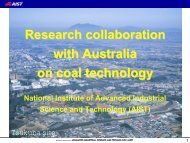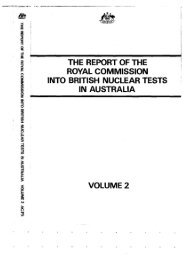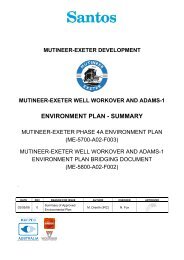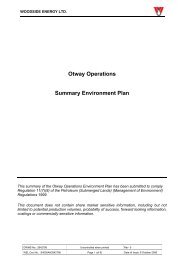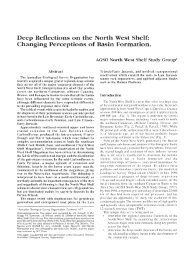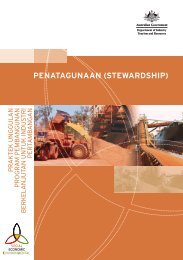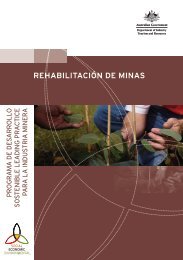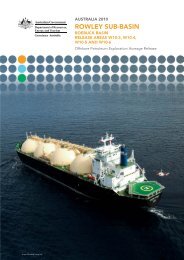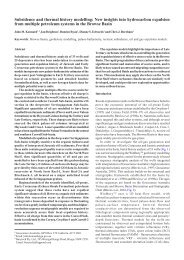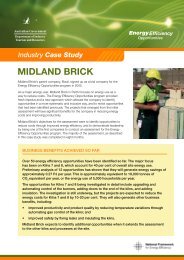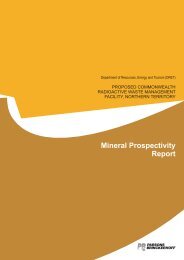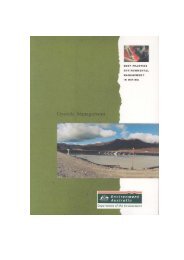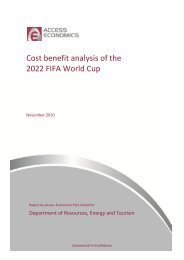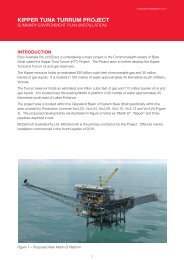A guide to leading practice sustainable development in mining
A guide to leading practice sustainable development in mining
A guide to leading practice sustainable development in mining
Create successful ePaper yourself
Turn your PDF publications into a flip-book with our unique Google optimized e-Paper software.
Engag<strong>in</strong>g with Indigenous communities<br />
The quest for new m<strong>in</strong>eral-bear<strong>in</strong>g fields is tak<strong>in</strong>g more and more exploration and<br />
m<strong>in</strong><strong>in</strong>g companies <strong>in</strong><strong>to</strong> areas occupied by Indigenous communities. Although the<br />
follow<strong>in</strong>g discussion will focus on the Australian situation, the same basic pr<strong>in</strong>ciples<br />
can be applied <strong>in</strong> North and South America, the Pacific, Asia and many other regions.<br />
One of the most important fac<strong>to</strong>rs shap<strong>in</strong>g the relationship between exploration<br />
and m<strong>in</strong><strong>in</strong>g companies and Indigenous communities is the ability of the parties<br />
<strong>to</strong> communicate effectively with each other. M<strong>in</strong><strong>in</strong>g companies and Indigenous<br />
communities have their own unique cultures and build<strong>in</strong>g strong relationships<br />
between the groups is dependent on each party understand<strong>in</strong>g that the other<br />
operates with<strong>in</strong> a very different value system. Without this shared understand<strong>in</strong>g, it<br />
is difficult <strong>to</strong> develop endur<strong>in</strong>g relationships that will enable both cultures <strong>to</strong> coexist<br />
amicably, or <strong>to</strong> manage effectively the issues that arise when m<strong>in</strong><strong>in</strong>g companies and<br />
Indigenous people are work<strong>in</strong>g <strong>to</strong>gether.<br />
The <strong>development</strong> of endur<strong>in</strong>g and <strong>susta<strong>in</strong>able</strong> agreements and relationships are<br />
dependent on the m<strong>in</strong><strong>in</strong>g <strong>in</strong>dustry and Indigenous people recognis<strong>in</strong>g the importance<br />
of cultural differences and explor<strong>in</strong>g ways <strong>to</strong> adapt, modify, and change cultural<br />
<strong>practice</strong>s. The challenge for m<strong>in</strong><strong>in</strong>g companies and Indigenous communities is <strong>to</strong><br />
change cultural <strong>practice</strong>s <strong>in</strong> ways that meet the culturally important or critical needs<br />
of one party while accommodat<strong>in</strong>g (<strong>to</strong> the extent possible) the objectives of the<br />
other party.<br />
Cultural <strong>practice</strong>s and responsibilities <strong>in</strong> relation <strong>to</strong> land estates differ markedly<br />
between Indigenous communities across Australia. Exploration and m<strong>in</strong><strong>in</strong>g<br />
companies prepar<strong>in</strong>g <strong>to</strong> work with Indigenous people for the first time will benefit<br />
from expert advice about those <strong>practice</strong>s and responsibilities. It is important <strong>to</strong><br />
acknowledge the many pro<strong>to</strong>cols associated with work<strong>in</strong>g on Indigenous land, for<br />
<strong>in</strong>stance the traditional welcome <strong>to</strong> country, the difference between women’s and<br />
men’s bus<strong>in</strong>ess, and ‘sorry bus<strong>in</strong>ess’. Prudent practitioners would seek expert advice<br />
on these matters. One situation where advice may be particularly important is when<br />
it comes <strong>to</strong> negotiat<strong>in</strong>g land access. M<strong>in</strong><strong>in</strong>g companies need <strong>to</strong> ensure that they are<br />
talk<strong>in</strong>g <strong>to</strong> the ’right‘ people, that is those with culturally appropriate responsibilities<br />
for country and with the authority <strong>to</strong> ’speak for country‘.<br />
On occasion people may assert such authority when that authority has not yet been<br />
widely bes<strong>to</strong>wed or acknowledged accord<strong>in</strong>g <strong>to</strong> cus<strong>to</strong>m. Similarly, it is also important<br />
<strong>to</strong> understand that, <strong>in</strong> some parts of Australia, the Indigenous people who have land<br />
management responsibilities based on his<strong>to</strong>rical connections <strong>to</strong> the land may be<br />
different from the Traditional Owners of that land accord<strong>in</strong>g <strong>to</strong> culture.<br />
Apart from cultural norms relat<strong>in</strong>g <strong>to</strong> land ownership, management and access,<br />
there are many other Indigenous cultural beliefs and <strong>practice</strong>s that may conflict<br />
with m<strong>in</strong><strong>in</strong>g <strong>in</strong>dustry norms. It is important for m<strong>in</strong><strong>in</strong>g companies <strong>to</strong> understand<br />
these cultural differences if companies are <strong>to</strong> engage successfully with Indigenous<br />
communities. For example, there are social cus<strong>to</strong>ms that Aborig<strong>in</strong>al people cannot<br />
ignore, such as the need <strong>to</strong> attend funerals, even though their frequency and<br />
importance may be difficult for m<strong>in</strong><strong>in</strong>g personnel <strong>to</strong> understand.<br />
A GUIDE TO LEADING PRACTICE SUSTAINABLE DEVELOPMENT IN MINING<br />
43



